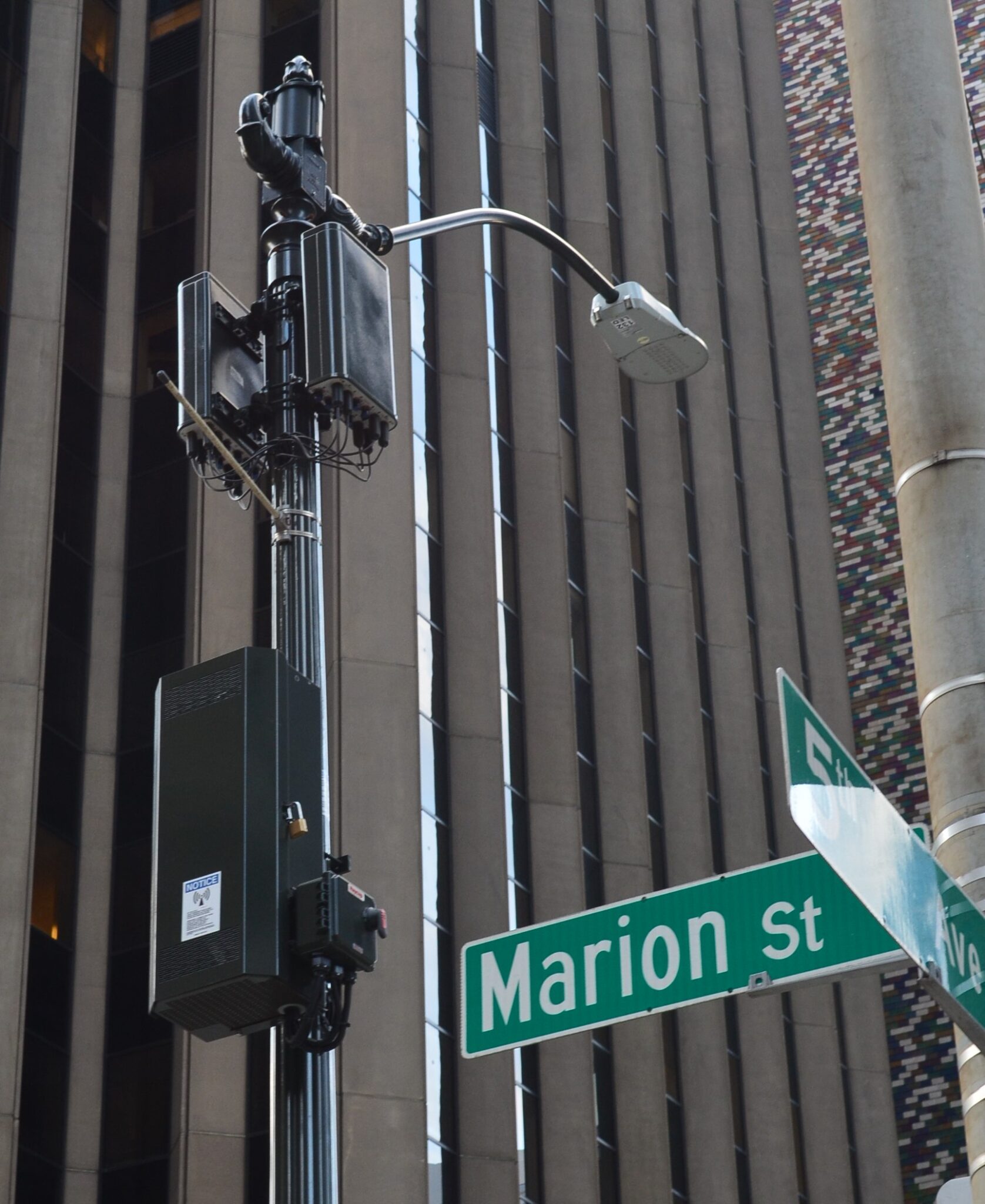 Cellular service technology attached to a pole in downtown Seattle. Photo courtesy the City of Seattle.
Cellular service technology attached to a pole in downtown Seattle. Photo courtesy the City of Seattle. The City of Seattle is enabling higher capacity wireless networks in Seattle through interdepartmental cooperation and collaboration between the City and the cellular industry. The City has worked with our industry partners for over two years to accelerate the expansion of ultrafast fifth-generation (“5G”) wireless services throughout Seattle.
According to wireless telecommunications experts, 5G networks can provide up to five times the performance and 100 times the capacity of 4G cellular technologies and are better adapted to specific applications and uses. The capacity of 5G networks also enables more competition for internet services, with cellular providers able to offer fixed-wireless high-speed internet to homes and businesses. Experts predict that 5G networks can drive transformative economic and job growth in Seattle and the US.
“Access to fast and reliable internet is essential in today’s world, and the City of Seattle is committed to bridging the digital divide and ensuring our communities are not left behind. But this is a challenge we cannot solve alone – it requires our One Seattle approach to building strong public-private partnerships and breaking down silos between City departments,” said Mayor Bruce Harrell. “Seattle is proud to be a global leader in technology and innovation, and this initiative ensures our residents can access the latest in wireless services.”
Constructing and upgrading wireless network infrastructure is a capital and time-intensive process. It requires a high degree of collaboration between 11 City departments and our cellular industry partners to deploy the wireless networks Seattleites enjoy today.
City staff in departments like Seattle City Light, Seattle Department of Transportation, and Seattle Department of Construction and Inspections are involved daily with conducting necessary site use and permit reviews and ensuring that work follows design and engineering standards for public rights-of-way and private properties. These reviews, permits, and standards ensure that critical City infrastructure can support the telecommunications services and continue to reliably serve our residents for the primary purposes of electrical transmission, traffic signaling, street lighting, and transportation.
Many other City departments also work with the cellular industry on projects that use City-owned structures, like water towers, parking garages, and the Seattle Center campus, to add the wireless infrastructure needed to enhance mobile services throughout the city.
“The collaboration between departments for this work is essential in developing the strong community partnership with the industry,” said City Councilmember Sara Nelson, citywide. “It’s all to better the connectivity of our residents and businesses in Seattle. Without these strong ties, we can’t continue to grow as a region.”
The Seattle Information Technology Department’s Wireless Affairs team serves as a hub to coordinate communications across City departments and with the wireless industry. They also convene quarterly wireless industry meetings to foreground the City’s central goal of digital equity around how and where wireless infrastructure and services are being deployed, help our partners work successfully within the City’s regulatory frameworks, and provide a platform for the industry to share feedback about City processes.
These combined efforts foster a One Seattle focus for telecommunications work, ensuring wireless infrastructure deployment that both protects the public’s interests in safety and aesthetics, while also achieving equitable telecommunications service levels that enable residents, businesses, and visitors to participate in digital culture and economy.
“Improving internet access in Seattle is critical to achieving greater digital equity for our community,” said the City of Seattle’s Interim Chief Technology Officer Jim Loter. “But this isn’t something one City department or even one agency can do alone. It’s a collective effort that requires a multitude of City departments, businesses, non-profits, community groups, and government partners. Expanding access to the internet is something we fundamentally believe is crucial to success for all Seattle residents.”
This established collaborative platform served the city during the Major League Baseball All-Star Game hosted at T-Mobile Park in July. The City of Seattle’s experience coordinating the work of multiple City departments and our pre-existing relationship with T-Mobile ensured that baseball fans and members of the extensive workforce needed to support the All-Star Game had access to reliable wireless cellular services throughout the five-day-long event.
The City and T-Mobile are also partnering on T-Mobile’s NextTech program, which aims to develop our local workforce by providing members of underrepresented populations with free training to get the skills and certifications needed to work in 5G network deployment jobs.
“I want our corporate values – diversity, equity, and inclusion – reflected in the suppliers we select and the employees they hire,” said Mike Simpson, Chief Procurement Officer, T-Mobile. “NextTech Diversity is one way we are encouraging opportunity for underrepresented populations in the future telecom workforce.”
T-Mobile’s NextTech program partner, the Learning Alliance, has launched a Seattle region training site in Gig Harbor to offer local opportunities for individuals to be trained, certified, and then placed in 5G network build-related jobs.
“By expanding our footprint into the Seattle region, we will bridge the gap between the skills development and employment opportunities in the 5G telecommunications ecosystem,” said Cesar Ruiz, President and CEO, Learning Alliance Corporation. “These careers provide high-skilled and high-wage employment toward financial self-sustainability for our local community.”
As technology continues to evolve, the City of Seattle looks forward to our partnerships with technology business partners evolving as well. Our shared goal of advancing our region’s residents and business community will remain strong.
The City of Seattle’s Information Technology Department (Seattle IT) oversees the City’s Digital Equity Program. To learn more about Digital Equity Programs, including the Technology Matching Fund Grant program, reduced-cost internet opportunities, and other programs, visit https://seattle.gov/tech. Seattle IT is a trusted partner that provides secure, reliable, and compliant technologies, enabling the City to deliver equitable and responsive services to the public.